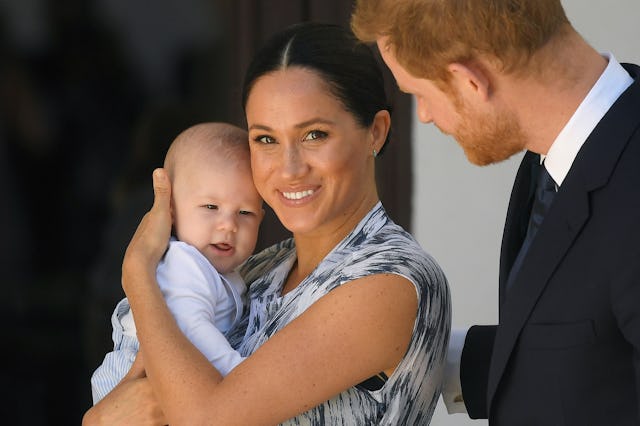Exploring Archie And Lilibet's Possible Royal Futures After Queen Elizabeth's Death
Prince Harry and Meghan Markle's children may gain royal titles now that their grandfather Charles is king.

As the world mourns the death of Queen Elizabeth II, and celebrates her years of leadership and service as the longest reigning monarch in British history, many are also wondering how the royals’ titles will shift in the coming weeks.
Prince Charles is now King Charles III, since a monarch-in-waiting immediately assumes the throne as soon as the reigning monarch dies. His ascension means his grandchildren’s titles will change, including those of Prince Harry and Meghan Markle’s 3-year-old son, Archie Harrison Mountbatten-Windsor, and 1-year-old daughter, Lilibet Diana Mountbatten-Windsor.
Although Harry and Meghan’s HRH titles were dropped when they stepped back as senior royals of the family, the current royal guidelines, which were created in 1917 by King George V, dictate that “the children of any Sovereign of the United Kingdom and the children of the sons of any such Sovereign and the eldest living son of the eldest son of the Prince of Wales shall have and at all times hold and enjoy the style, title or attribute of Royal Highness with their titular dignity of prince or princess.”
This means that, if their parents accept the titles, Archie and Lilibet — who was given Queen Elizabeth’s childhood nickname as her moniker — could be known as Prince Archie and Princess Lilibet. Down the line, Archie could be given the secondary Sussex title before inheriting the dukedom.
Amid his birth announcement, Buckingham Palace said the Duke and Duchess of Sussex chose not to use a title for their first-born and that he’d be known simply as Master Archie Mountbatten-Windsor. But in Harry and Meghan’s explosive interview with Oprah Winfrey in March 2021, the duchess revealed that discussions with “the firm” about Archie’s title helped kick off the family’s royal exit. She suggested her son was denied a royal title because of his race.
“They didn’t want him to be a prince or princess, not knowing what the gender would be — which would be different from protocol — and [said] that he wasn’t going to receive security,” Meghan said, adding, “In those months when I was pregnant, all around this same time... we had in tandem the conversation of ‘he won’t be given security, he’s not going to be given a title,’ and also concerns and conversations about how dark his skin might be when he was born.”
Meghan and Harry never shared who in the royal family was having those discussions, as it would be “very damaging to them,” but questions swirled over this particular segment of the interview for months.
Whether Meghan was really told that Archie’s access to protection depended on his status as a royal still up in the air, but as an example, Princesses Beatrice and Eugenie did not have access to royal protection until their university years, and now have none since they no longer fulfill public roles. (Rumor has it, their status is due to Charles’ reported desire to “slim down” the monarchy.)
When considering the protocols established in 1917, Archie was only the great-grandchild of a sovereign at the time of his birth. (For great-grandchildren of a monarch, only “the eldest living son of the eldest living son of the Prince of Wales” would automatically be considered a prince at birth — Prince George. Although his siblings are also known as Princess Charlotte and Prince Louis after the Queen issued a Letters Patent which stated that all children of the eldest son of the Prince of Wales — formerly, William — should have such titles.)
As Archie is now the grandchild of the king, he has the automatic right to the title HRH and prince, unless Charles issues his own Letters Patent amending Archie’s right to be a prince and Lili’s right to be a princess (which we suspect he won’t do, but who knows when considering the current royal family dynamics.)
Harry and Meghan have never been concerned about royal titles, but, again, are more so interested in the security and protection that comes with one. During the Oprah interview, Meghan said that “if it meant he was going to be safe, then of course” she would want Archie to be a prince, and Lilibet to be a princess.
“I have a lot of clarity on what comes with the titles, good and bad, and, from my experience, a lot of pain,” she said. “I wouldn’t wish pain on my child, but that is their birthright to then make a choice about.”